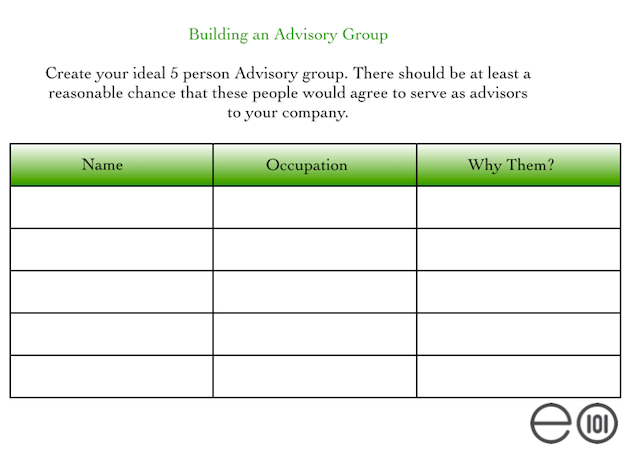Building An Advisory Group
Wise entrepreneurs will seek input from experienced and trusted advisors. Those who are not yet ready for a formal Board of Directors may develop an Advisory Group.
Composition
1. The Advisory Group is usually a manageably sized core (5 to 7 people?) with diverse skills. Here is an opportunity for entrepreneurs to fill in some of their own clear skill gaps. The last thing you want here is a group of similarly educated and experienced colleagues talking shop.
2. This is an opportunity to hear from a cooperative range of voices, rather than a tight group of like-minded friends who come with their own pre-conceived biases around who you are and what you should do with your business. These advisors should not be employees or previously hired consultants (your accountant, lawyer…) who depend on you for their livelihood.
3. Respected advisors can add credibility to a new business if they are willing to be publicly affiliated with your venture. As ever, though, there is no free lunch. You need to understand why your advisors are there – what do they want to get out of this and what do they expect in return?
4. New ventures have different needs than large, established organizations. Are your advisors skilled in start-up thinking and issues?
5. There should be time-bounds on the Advisory Group commitment. You’re not asking them to commit for life. You also need an out if you are finding them difficult or unhelpful. Structuring an understanding is worth discussing with your legal advisors.
Functioning
There is large variance in how these Advisory Groups run. It is important that entrepreneurs are explicit in setting expectations around what this advisory role entails.
1. If this is a for-profit group, there will usually be some sort of incentive for advisors. This can be a retainer, a set fee for meetings, an honorarium. Some mentors will agree to sit on an Advisory Group for no cost. As ever, the entrepreneur should be careful about giving away equity in the business as a lure.
2. Confidentiality Entrepreneurs should talk to their legal advisors about how best to ensure confidentiality in discussions and data sharing with the Advisory Group.
3. Some entrepreneurs will only meet one on one with their advisors. There are clear advantages to group meetings – cross-field strategizing, a big picture view – but these should have a concise agenda with clearly-stated expectations around how the Founder may or may not use the input.
4. It is easy for busy entrepreneurs to start taking their advisors for granted – offering them insufficient notice on questions and concerns, calling on them too often and showing little appreciation for their efforts.
Chances are – if you have a good group of Advisors – you are paying them far less than they could get for their time elsewhere. The last thing you want to do is alienate good Advisors and build ill-will around your venture. Smart entrepreneurs take the time to celebrate their advisors individually and as a group.


